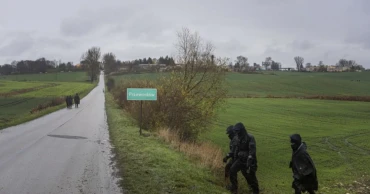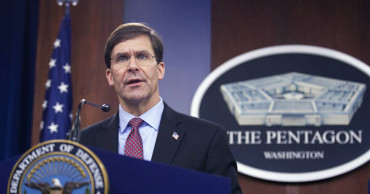missile strike
Russian missile strike in Ukraine's south, shelling in east kill at least 6 people
Russian forces fired cruise missiles at the southern Ukrainian city of Odesa overnight and shelling destroyed homes in the eastern Donetsk region early Wednesday, killing at least six people and injuring more than a dozen others, regional officials said.
A Ukrainian military spokesman said Russian forces have stepped up aerial strikes in their more than 15-month war against Ukraine, just as the country's troops have reported limited gains in an early counteroffensive.
Also Read: Ukraine recaptures village as Russian forces hold other lines, fire on fleeing civilians elsewhere
In the east, Donetsk regional governor Pavlo Kyrylenko wrote on Telegram that at least three people died after shelling destroyed seven homes and damaged dozens more in the cities of Kramatorsk and Konstantinovka.
In Odesa, three employees of a food warehouse were killed and seven others injured in a strike that damaged homes, a warehouse, shops and cafes downtown, he regional administration said on Facebook. Another six people — guards and residents of a neighboring house — were injured.
Searchers were looking for possible survivors under the rubble, it said.
Also Read: Ukraine's dam collapse is both a fast-moving disaster and a slow-moving ecological catastrophe
The attack on the port city, launched from the Black Sea, involved four Kalibr cruise missiles, three of which were intercepted by air defenses, the administration said.
Andriy Kovalov, a spokesperson for Ukraine's General Staff, said Russian forces have increased missile and aerial strikes on Ukraine.
In a briefing, he said strikes on the Kharkiv, Donetsk and Kirovohrad regions, in addition to the Odesa region, involved Kh-22 cruise missiles, sea-launched Kalibr cruise missiles, and Iranian-made Shahed drones. Nine were intercepted.
Kovalov said Ukrainian forces made advances on several fronts of the roughly 1,000-kilometer (600-mile) front line, and fighting was continuing in or near at least two settlements in the eastern Donetsk region. Russia has occupied and controls nearly one-fifth of Ukrainian territory.
Also Read: Top UN court allows a record 32 countries to intervene in Ukraine's genocide case against Russia
Britain's Ministry of Defense, which has regularly issued updates on the conflict, wrote on Twitter that southern Ukraine "has often been more permissible for Russian air operations" compared with other parts of the front.
Separately, the mayor of the central city of Kryvyi Rih, President Volodymyr Zelenskyy's hometown, said the death toll from a Russian strike a day earlier that hit an apartment building had risen to 12.
2 years ago
Deadly missile strike adds to Ukraine war fears in Poland
Since the invasion of Ukraine more than eight months ago, Poland has aided the neighboring country and millions of its refugees — both to ease their suffering and to help guard against the war spilling into the rest of Europe.
But a missile strike that killed two men Tuesday in a Polish village close to the Ukrainian border brought the conflict home and added to the long-suppressed sense of vulnerability in a country where the ravages of World War II are well remembered.
“The thing that I dread most in life is war. I don’t want to ever experience that,” said Anna Grabinska, a Warsaw woman who has extended help to a Ukrainian mother of two small children.
One of the men killed in Przewodow was actively helping refugees from Ukraine who had found shelter in the area.
NATO and Polish leaders say the missile was most likely fired by Ukraine in defense against a Russian attack. Now shaken Poles fear for their future, and political commentators warn that the strike should not be allowed to hurt relations with Ukraine, which have recently grown closer through Poland’s solidarity.
“There is fear, anxiety for what will happen the next night or the next day,” villager Kinga Kancir said. When Russia invaded Ukraine on Feb. 24, millions of Poles dropped what they were doing to help. They took time off work and rushed to the border to offer strangers rides in their cars and places in their homes. They stood in the cold and served soup. Polish mothers left baby prams at a railway station at the border for fleeing Ukrainian mothers they would never meet.
People acted on humanitarian impulse, but their generosity was also a conscious contribution to the Ukrainian war effort. By keeping Ukrainian women and children safe, the Poles ensured more men could fight Russian forces.
Poland has a long history of conflict with Moscow.
Russia was one of the three powers that divided Poland in the 18th century and — jointly with Austria and Prussia — erased it from Europe’s maps for more than 100 years, brutally suppressing drives for freedom. After World War II, Poland was an unwilling part of the East Bloc and remained under Moscow’s domination for over four decades, until the Poles peacefully toppled the communist government. In their current solidarity with Ukraine, many Poles put aside historical grievances rooted in ethnic conflict, including oppression of Ukrainians by Poles and a brutal massacre by Ukrainians of some 100,000 Poles during World War II in regions not far from Przewodow.
Read more: Poland, NATO say missile strike wasn't a Russian attack
The Polish government offered temporary accommodations and financial aid to refugees and gave money to Poles who housed them. The refugees also receive access to free state medical care, school for their children and help finding jobs.
The war changed a lot for Poland too. It drew the world’s attention to Warsaw, where top leaders including U.S. President Joe Biden came to show their support for Ukraine and for Poland’s aid efforts.
The conflict has strengthened Poland’s ties with its NATO allies, especially with the U.S., which sent thousands of troops to southeast Poland, close to the Ukrainian border, as Poland became a conduit for weapons sent from the West to Ukraine. The world’s humanitarian and medical efforts also pass through Poland.
Russia’s aggression has pushed Warsaw to increase the country’s defense budget and spend billions of dollars on weapons from the U.S. and South Korea. Poland is also actively supporting Ukraine’s aspirations to strengthen its ties with the West and become part of the European Union.
But as the war has dragged on, some Poles have become exhausted. Many are tired of hosting strangers in their homes and paying skyrocketing energy costs. They complain that Ukrainians have taken jobs from Poles and left some families without places in public kindergartens. The huge demand for housing has pushed up rents in big cities.
As winter approaches, there are concerns that the grumbling could grow louder.
The deputy editor of Rzeczpospolita, a major daily newspaper, voiced concerns that bitterness over the missile deaths could become a pretext to weaken Poland’s commitment to Ukraine or to drive a wedge between the two neighbors.
“Unfortunately, there are already voices that would like to use this tragedy to make Poland and Ukraine quarrel. And that would be absolutely against our national interest,” Michal Szuldrzynski wrote in an opinion piece published Thursday.
Read more: Russian missiles cross into Poland during strike on Ukraine, killing 2
“By defending their independence, Ukrainians defend the West, including Poland. Therefore, our response to the tragedy in Przewodow should be not sulking at Ukraine, but even stronger support to increase its chances of driving the aggressor out of its country,” Szuldrzynski wrote.
A spokesman for Poland’s main ruling party, Radoslaw Fogiel, on Thursday reiterated Poland’s support for Ukraine and stressed that responsibility for the war rests entirely with Russia.
Fogiel warned that any discord between Warsaw and Kyiv would be in Moscow’s interests.
Polish President Andrzej Duda visited the site of the missile strike and talked to investigators. “There is a war across our border. Russia fired hundreds of missiles, Ukraine was defending itself. Nobody wanted to hurt anyone in Poland,” Duda said. “This is our common tragedy.”
In Przewodow, a farming community of some 500 people about 6 kilometers (4 miles) from the border with Ukraine, villagers were in shock when the missile killed two employees of a grain-drying facility, men they had known, at least by sight.
“Today we have a new situation that is very hard for us, and especially difficult for our children,” said Ewa Byra, the director of the village school.
The children kept asking: “Are we safe here so close to the border?” and “Are our parents safe?” Byra told The Associated Press.
The primary school suspended classes and offered psychological counseling for families.
“There is sadness because two people were killed here, and that is not a regular thing to happen in such a small village,” observed Kancir, 24, a mother of two small children who said one of the men who was killed lived just across the road from her apartment building.
The two men, ages 60 and 62, shared the same first name: Bogdan. One was the husband of a school staff member, and the other the father of a recent pupil. One was a warehouseman at the grain-drying facility; the other was the tractor driver.
One of them helped bring food and clothes to Ukrainian refugees and drive them to local offices to help them with the paperwork, said Stanisław Staszczuk, the county secretary.
In the aftermath, villagers are intimidated by the huge police presence in their usually quiet home.
“It is very hard to accept this, what happened, because it has always been quiet, quiet. Nothing was ever going on here, and all of a sudden there is a world sensation,” Kancir said.
3 years ago
Poland, NATO say missile strike wasn't a Russian attack
NATO member Poland and the head of the military alliance both said Wednesday there is “no indication” that a missile that came down in Polish farmland, killing two people, was an intentional attack, and that air defenses in neighboring Ukraine likely launched the Soviet-era projectile to fend off a Russian assault that savaged its power grid.
“Ukraine’s defense was launching their missiles in various directions and it is highly probable that one of these missiles unfortunately fell on Polish territory," said Polish President Andrzej Duda. “There is nothing, absolutely nothing, to suggest that it was an intentional attack on Poland.”
NATO Secretary-General Jens Stoltenberg, at a meeting of the 30-nation military alliance in Brussels, echoed the preliminary Polish findings, saying: “We have no indication that this was the result of a deliberate attack.”
Read more: Russian missiles cross into Poland during strike on Ukraine, killing 2
The initial assessments of Tuesday's deadly missile landing appeared to dial back the likelihood that the incident would trigger another major escalation in the nearly 9-month Russian invasion of Ukraine. If Russia had deliberately targeted Poland, it could have risked drawing NATO into the conflict.
Still, Stoltenberg and others laid overall but not specific blame on Russian President Vladimir Putin’s war.
“This is not Ukraine’s fault. Russia bears ultimate responsibility,” Stoltenberg said.
Before the Polish and NATO assessments, U.S. President Joe Biden had said it was “unlikely” that Russia fired the missile but added: “I’m going to make sure we find out exactly what happened.”
Three U.S. officials said preliminary assessments suggested it was fired by Ukrainian forces at an incoming Russian one. The officials spoke on condition of anonymity because they weren't authorized to discuss the matter publicly.
That assessment and Biden’s comments at the Group of 20 summit in Indonesia contradicted information earlier Tuesday from a senior U.S. intelligence official who told The Associated Press that Russian missiles crossed into Poland.
Former Soviet-bloc country Ukraine maintains stocks of Soviet- and Russian-made weaponry, including air-defense missiles, and has also seized many more Russian weapons while beating back the Kremlin’s invasion forces.
Ukrainian air defenses worked furiously against the Russian assault Tuesday on power generation and transmission facilities, including in Ukraine’s western region that borders Poland. Ukraine’s military said 77 of the more than 90 missiles fired were brought down, along with 11 drones.
The Kremlin on Wednesday denounced Poland’s and other countries’ initial response to the missile landing and, in rare praise for a U.S. leader, hailed Biden's "restrained, much more professional reaction.”
“We have witnessed another hysterical, frenzied, Russophobic reaction that was not based on any real data,” Kremlin spokesman Dmitry Peskov said. He added that “immediately, all experts realized that it could not have been a missile linked to the Russian armed forces."
Still, Ukraine was under countrywide Russian bombardment Tuesday by barrages of cruise missiles and exploding drones, which clouded the initial picture of what exactly happened in Poland and why.
In Europe, NATO members Germany and the U.K. laced their calls for a through investigation of the missile landing with criticism of Moscow.
“This wouldn’t have happened without the Russian war against Ukraine, without the missiles that are now being fired at Ukrainian infrastructure intensively and on a large scale,” said German Chancellor Olaf Scholz.
U.K. Prime Minister Rishi Sunak said: “This is the cruel and unrelenting reality of Putin’s war.”
Ukrainian President Volodymyr Zelenskyy called it “a very significant escalation." On the other end of the spectrum, China was among those calling for calm and restraint.
Read more: Biden calls ‘emergency’ meeting after missile hits Poland
Damage from the aerial assault in Ukraine was extensive and swaths of the country were plunged into darkness. Zelenskyy said about 10 million people lost power but tweeted overnight that 8 million were subsequently reconnected, with repair crews laboring through the night. Previous Russian strikes had already destroyed an estimated 40% of the country’s energy infrastructure.
The missile landed in the Polish farming village of Przewodow near the border with Ukraine.
The Russian bombardment also affected neighboring Moldova. It reported massive power outages after the strikes in Ukraine disconnected a power line to the small nation.
Tuesday's assaults killed one person in a residential building in Ukraine's capital, Kyiv. It followed days of euphoria in Ukraine sparked by one of its biggest military successes — the retaking last week of the southern city of Kherson.
With its battlefield losses mounting, Russia has increasingly resorted to targeting Ukraine’s power grid, seemingly hoping to turn the approach of winter into a weapon by leaving people in the cold and dark.
3 years ago
Russian missile strike hits crowded shopping mall
Scores of civilians were feared killed or wounded in a Russian missile strike Monday on a crowded shopping mall in Ukraine's central city of Kremenchuk, Ukrainian officials said.
Ukrainian President Volodymyr Zelenskyy said in a Telegram post that the number of victims was "unimaginable," citing reports that more than 1,000 civilians were inside at the time of the attack.
Images from the scene showed giant plumes of black smoke from the shopping centre engulfed in flames, as emergency crews rushed in and onlookers watched in distress.
At least 13 people were dead and more than 40 wounded, according to the regional governor, Dmytro Lunin, who said rescuers were continuing to comb the smouldering debris for more victims.
The strike unfolded as Western leaders pledged continued support for Ukraine, and the world's major economies got ready to pursue new sanctions on Russia, including a price cap on oil and higher tariffs on goods.
Meanwhile, the US appeared ready to respond to Zelenskyy's call for more air defence systems, and NATO planned to increase the size of its rapid-reaction forces nearly eightfold – to 300,000 troops.
Zelenskyy said the mall presented "no threat to the Russian army" and had "no strategic value."
He accused Russia of sabotaging "people's attempts to live a normal life, which make the occupiers so angry."
The Ukrainian military said the shopping centre was hit by missiles fired by Russian Tu-22M3 long-range bombers from the skies over Russia's western Kursk region.
The secretary of Ukraine's National Security and Defense Council, Oleksiy Danilov, said one missile hit the shopping centre and another struck a sports arena in Kremenchuk.
The Russian strike carried echoes of attacks earlier in the war that caused large numbers of civilian casualties – such as one in March on a Mariupol theatre where many civilians had holed up, killing an estimated 600, and another in April on a train station in eastern Kramatorsk that left at least 59 people dead.
"Russia continues to take out its impotence on ordinary civilians. It is useless to hope for decency and humanity on its part," Zelenskyy said.
Mayor Vitaliy Maletskiy wrote on Facebook that the attack "hit a very crowded area, which is 100 percent certain not to have any links to the armed forces."
The United Nations called the attack on the shopping centre "deplorable," stressing that civilian infrastructure "should never ever be targeted.
The attack happened as Russia was mounting an all-out assault on the last Ukrainian stronghold in eastern Ukraine's Luhansk province, "pouring fire" on the city of Lysychansk from the ground and air, according to the local governor.
At least eight people were killed and more than 20 wounded in Lysychansk when Russian rockets hit an area where a crowd of people gathered to get water from a tank, Luhansk Governor Serhiy Haidai said.
Russian forces appeared to step up an offensive centring on trying to wrest the eastern Donbas region from Ukraine after forcing government troops out of the neighbouring city of Sievierodonetsk in recent days.
To the west of Lysychansk Monday, the mayor of the city of Sloviansk – potentially the next major battleground – said Russian forces fired cluster munitions on the city after dawn, including one that hit a residential neighbourhood.
Authorities said the number of dead and wounded had yet to be confirmed. The Associated Press saw one fatality: A man's body lay hunched over a car door frame, his blood pooling onto the ground from chest and head wounds.
The blast blew out most windows in the surrounding apartment blocks and the cars parked below, littering the ground with broken glass.
"Everything is now destroyed. We are the only people left living in this part of the building. There is no power," said local resident Valentina Vitkovska, in tears as she spoke about the blast. "I can't even call to tell others what had happened to us."
Overall, Zelenskyy's office said at least six civilians were killed and 31 others wounded as part of intense Russian shelling against various Ukrainian cities over the past 24 hours – including Kyiv and major cities in the country's south and east, but not counting the attack in Kremenchuk and the shelling of the eastern city of Kharkiv where at least five people were killed and another 15 were wounded.
It said Russian forces fired rockets that killed two people and wounded five overnight in and near Kharkiv, Ukraine's second-largest city, and continued to target the key southern port of Odesa. A missile attack destroyed residential buildings and wounded six people, including a child.
In Lysychansk, at least five high-rise buildings in the city and the last road bridge were damaged over the past day, the regional governor said.
A crucial highway linking the city to the government-held territory to the south was rendered impassable by shelling.
The city had a prewar population of around 100,000, around one-tenth of whom remain.
Analysts say that Lysychansk's location high on the banks of the Siverskyy Donets River gives a major advantage to the city's Ukrainian defenders.
"It's a very hard nut to crack. The Russians could spend many months and much effort storming Lysychansk," said military analyst Oleh Zhdanov.
In other developments, in Germany's Bavarian Alps, leaders of the Group of Seven countries unveiled plans to seek new sanctions and pledged to continue supporting Ukraine "for as long as it takes."
In a joint statement Monday after they held a session by video link with Zelenskyy, the leaders underlined their "unwavering commitment to supporting the government and people of Ukraine in their courageous defence of their country's sovereignty and territorial integrity."
Elsewhere, Washington was expected to announce the purchase of an advanced surface-to-air missile system for Ukraine.
In Brussels, NATO Secretary-General Jens Stoltenberg announced the plans to greatly expand the alliance's rapid-reaction forces as part of its response to an "era of strategic competition." The NATO response force now has about 40,000 soldiers.
NATO will agree to deliver further military support to Ukraine – including secure communication and anti-drone systems – when its leaders convene in Spain for a summit, Stoltenberg said.
Britain's defence ministry said Russia is likely to rely increasingly on reserve forces in the coming weeks of the war.
Analysts have said a call-up of reservists by Russia could vastly alter the balance in the war but could also come with political consequences for President Vladimir Putin's government.
Also read: Biden urges Western unity on Ukraine amid war fatigue
3 years ago
Eleven US troops flown to medical centers after Iran strike
Eleven U.S. troops were flown out of Iraq for evaluation of concussion-like symptoms in the days following an Iranian missile strike that President Donald Trump had said caused no harm to American forces, officials said Friday.
6 years ago



.jpg)




